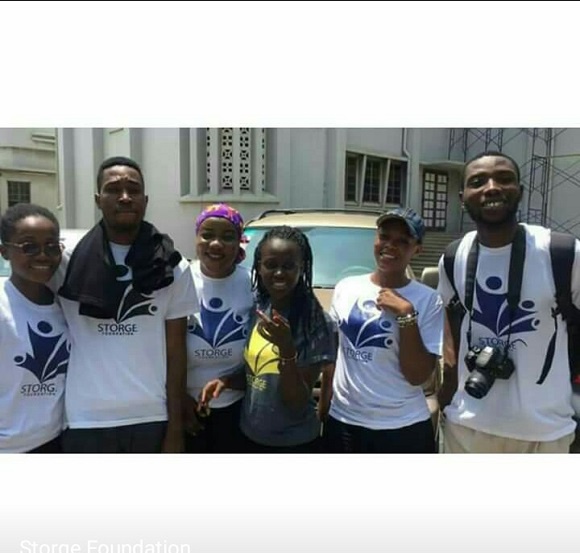Ghana is known to have achieved the Millennium Development Goals (MDGs) of halving poverty in 2010 ahead of its 2015 deadline. It was expected that the impressive growth performance of Ghana over the years and improvement in social intervention programs (such as the LEAP, NHIS, MASLOC, etc) will have contributed considerably to the progress of eradicating poverty, unemployment, and improve standards of living of the citizens of the country.
The politics and the mismanagement of the social interventions programs, amidst corruption has not helped Ghana to progress to the pedestal of shredding shoulders with other developed countries. The threats of these consequences have risen to the alarming stage of gross insecurity and misbehavior of citizens of this country, especially the youth.
Storge Foundation; is a social-support community based non-governmental organization that has supported the girl-child, children and women in all forms against poverty. For a period now, it has supported the fight of eradicating poor and disabled, especially children and women on the streets through its community initiative of adopting the girl child and sending the “street homed” persons to their original homes, if possible within its means.
Since the last quarter of this year, the foundation in its research has found out that, the large sums of money spent on projects of fighting “streetism” (that is children living on the streets) amounts to an insignificant progress.
This means that, as more children and women are encouraged to find at least a menial job opportunity or return to school or back to their homes, the newer faces [children] come to find shelter on the same insecure locations. All of these, truth be told, surmounts to the failure of the government’s social intervention programs to help the poor, vulnerable and disabled.
The foundation is fully aware of the reports that have affirmed the census of children and women living on the streets. It was absconded to note that about 20,000 children end up on the streets on circumstances that largely justify such inconveniences. What is alarming is the increasing percentages of the girl child on the streets and its devoting effects of their future.
In 2016/17, about 61,492 children are leaving just on the streets of Accra bedeviling with the harsh weather conditions, sexual harassments, diseases, amidst others. This violates their rights as children enshrined in the children’s rights act upheld by the letter and spirit of the constitution of Ghana.
It has become obvious that our beloved country is still grappling with this canker of “streetism” which is eating into the good fabric as a country that is swift in providing social enterprise supports to its citizens and strong on development and progress. It is high time the will of the government sector on child and social protection tackles it even against its political interpretations.
The major concern here has nothing to do with the periodic seasons when NGOs rush to the streets to provide gifts and capture the moments on their cameras, but how the government can enlarge its social protection basket to cover the children who find their way back or perhaps children who cannot find themselves in decent homes supported by the government.

Considering the high rate of “streetism” incidences, it is incumbent on government to ensure its multifaceted social policies capture the attention of children and women and perhaps the underage, vulnerable and the marginalized. As a sole responsibility of ensuring the social protection and security of its esteemed citizens, the government can ensure that it social intervention programs such as the;
1. Livelihood Empowerment Against Poverty (LEAP) is widely expanded to support mothers or families who even out of broken homes can take responsibility of the children and also take their children to school. This Family Support Program (FSP) can be added to the LEAP cash transfer system. It will serve as a major contributor to the fight of eradicating children and women from the streets, since mothers will undertake a more patriotic role in ensuring the protection and education of their children.
2. Establishing children’s homes for the street children as a way of ensuring their protection from disorganized and broken homes, desire for freedoms, stigma, harassments, rape, and the fight against the use of drugs. Meanwhile, ensuring that these homes also serves as correctional centers against social vices, and be an educational, vocational and technical environment conducive for their development.
3. Expand funding and improved rural and district-centered social support programs in order to reduce to the minimal level of cases of migration and people moving with caregivers into the cities.
4. Discourage and sanction parents, guardians, or relatives who send the child to the streets to beg for money. However, cautioning children who fall into their acts as an offense against the State.
5. With earnest expectations, encourages the government to revamp and accelerate its social welfare departments in districts, regions, and to work with other international bodies such as the UNICEF to ensure that children and women as well supported and protected as esteem assets to the nation.
Signed
Petitioner
Victoria Akosua Yirenkyi
Akosuayirenkyi464@gmail.com
Storge Foundation
P.O.BOX 1017,
ACCRA.
+233 (0)26 543 6322
Opinions of Wednesday, 27 December 2017
Columnist: Storge Foundation















